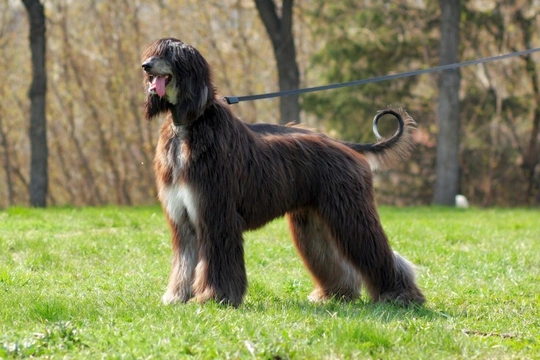
5 personality traits of the Afghan hound
While the Afghan hound is not one of the most common dog breeds that you will see out and about in the UK, they are very distinctive, and people seeing one for the first time often stop in their tracks to admire these tall, lean and very handsome dogs with their luxurious long coats.
Their sweet personalities and silky-fine fur are among the breed’s chief appeals, and many Afghan hound owners say that the first time they saw a dog of the breed, they knew immediately that it was the right dog for them.
However, considering ownership of an Afghan hound is not something to rush into, and it is important to get a good understanding of the breed and their core traits, and ensure that they are a good match for you before going forwards.
In this article, we will talk about five universal personality traits of the Afghan hound, in order to add some perspective to the rest of your research and help you to make an informed decision. Read on to learn more.
1. They have a strong prey drive
The Afghan hound might be very unique to look at and bear little resemblance to any other breed, but when you look again and take in their long legs and lean frame, it is easy to tell that they are one of the sighthound breeds. Sighthounds are breeds that hunt prey by sight, and have both the tenacity and running speed to be successful in their pursuits.
This is something that anyone considering buying an Afghan hound should be aware of-they have a very high prey drive, and so you will need to take special care to ensure the protection of smaller animals when out walking with your dog, and any time that they may be off the lead.
2. They are rather highly strung
The Afghan hound’s distinctive appearance and strikingly long fur makes them look every inch the diva, and most Afghan hounds really live up to the role of drama queen!
Dogs of the breed tend to be fairly highly strung, and while they are not particularly onerous in terms of their exercise requirements, generally needing only an hour of exercise and free running each day, they can be quite fussy!
They tend to dislike change and like everything to be just so-meals served at set times, and often, they will be rather picky about food, although there are always exceptions! They also tend to make quite the fuss if they acquire even a very minor bump or injury, and if you offend them, they will do a very good impression of sulking for some time afterwards!
3. They need a lot of coat maintenance
The long, silky coat of the breed does not stay looking beautiful for long unless you take care of it, and in terms of the maintenance requirements of their coats, they are among the most onerous of breeds to look after.
They need their whole coat, including under the belly and the hard-to-reach armpits brushed and combed out fully every day, and even neglecting the routine for a couple of days will result in knots and tangles.
Additionally, they benefit from a bath every few weeks too, to keep their coat and skin in good condition.
4. They are not the smartest of breeds!
Nobody likes to hear that their own dog is not the sharpest knife in the drawer, but the Afghan hound is certainly not the smartest of breeds.
In the Coren ranking of canine intelligence by breed, the Afghan hound falls in the very bottom position of all of the breeds assessed, which means that if you are looking for a dog to teach tricks or to take part in canine sport with, the Afghan hound will not be a good pick.
When it comes to training an Afghan hound, it is important to manage your expectations-they will probably only be able to learn and execute five to ten basic commands, and it can take some time even to teach them these. You may also find that your dog will rarely follow a command the first time, and may need some prompting and coaching!
5. They are sensitive and very loving
Finally, if you are looking for a soulful, highly affectionate dog that is very loving and that likes to be close to their family at all times, the Afghan hound may well be just the breed that you are looking for.
Once they have decided that they like you, they will bond with you quickly to the point of infatuation, and will do everything that they can to stick close to you at all times, even sometimes following you from room to room in the house!
They are fairly sensitive souls too, and they tend not to thrive in very busy, noisy households or those with young children, although there are of course exceptions.



